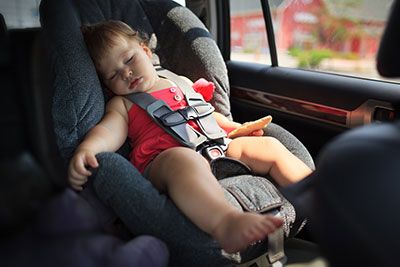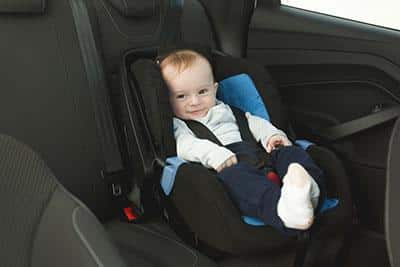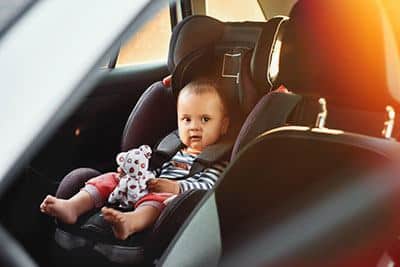It's every parent's nightmare: leaving your child strapped in their car seat for too long. When it comes to ensuring your baby stays safe, it is critical to adhere to the 2-Hour Rule: no more than two consecutive hours with a baby buckled up in their car seat or carrier.
In this guide, we have compiled all the necessary information you need to know about why and how following the 2-Hour Rule should be part of your family's driving routine.
From proper fit and positioning advice on keeping your kids safe while on long car trips to tips for limiting travel time when possible.
Also, you will read about potential medical complications that can arise if a baby in car seat too long, and other important factors to consider before buckling up.
More...
Take Away Key Points:
Table of Contents
What is the 2-hour rule?

When infants travel, they must be secured in their own travel systems or car seats. The 2-hour rule for children in infant car seats is a general guideline that recommends infants should not be left in a car seat for more than 2 hours at a time. This guideline is typically recommended for infants under the age of 2 years old who are still using rear-facing car seats.
The American Academy of Pediatrics recommends that infant car safety seats should not be used as a routine infant sleep environment.
To keep the baby safe in the rear-facing car seat, prolonged periods in a car seat can cause discomfort, poor circulation, and even breathing problems for young children. This is because being in a semi-upright position for extended periods in car safety seats can pressure the baby's body and make it difficult for them to breathe properly.
Additionally, infants who are still developing their neck muscles may have difficulty holding their heads up while in this position.
According to a study funded by the Lullaby Trust in October 2016 and conducted by the NHS Foundation Trust and the University of Southampton, parents should avoid leaving infants or babies in car seats for extended periods. Not only is this scrunched position uncomfortable, but being rocked back and forth from the vehicle's movement negatively impacts their well-being.
It's important to follow the manufacturer's guidelines when it comes to using car seats and to take regular breaks during long car journeys to allow your child to stretch out and move around.
Your baby has been in the car seat for more than two hours. Now what?
If your baby has been in the car seat for more than two hours, it's important to take a break as soon as possible. The longer your baby is in the car seat, the greater the risk of discomfort, poor circulation, and breathing problems, according to safety experts.
To help alleviate any discomfort and promote healthy circulation, you can take your baby out of their car seat and allow them to stretch out and move around for a while. This can be done by stopping at a rest area or other safe location where you can remove your baby from their car seat and let them lie down on a lie-flat position surface or play area.
If you're on a long journey with your baby, it's recommended that you plan regular breaks every 1-2 hours to allow your child to move around and stretch out. This will not only help prevent discomfort but also make the journey more enjoyable for both you and your child.
The potential risk of sitting in the car seat for too long
Leaving babies in car seats too long can pose potential risks to infants and young children. One of the main concerns is that being in a semi-upright position for an extended period can cause discomfort, poor circulation, and even affect babies breathing difficulties by restricting baby lungs and restricted airflow.
Infants who are still developing their neck muscles may also have difficulty holding their head up while in this position, which can lead to strain on their neck and back muscles. Prolonged periods in a car seat can also increase the risk of developing plagiocephaly, or flat head syndrome, which is a condition where the skull becomes flattened due to prolonged pressure on one area.
Compared to lying flat in a cot, when newborn or premature babies sat in car seats for thirty minutes, their heart rate accelerated, and their blood oxygen levels dropped.
In addition to physical discomfort, sitting in a car seat for too long may also lead to emotional distress. Infants and young children need social interaction and stimulation to help promote healthy development. Being confined to a car seat for extended periods without any interaction or stimulation can lead to boredom and stress.
How to tell if the baby has been in the car seat for too long?

It can be difficult to determine exactly how long it is too long to leave babies in a car seat, as it can vary depending on the age and developmental stage of the child. However, there are some signs you can look out for that may indicate your baby has been in their car seat for too long, so you can ensure car seat safety:
- Discomfort: If your baby appears restless or uncomfortable, this may be a sign that they have been in their car seat for too long.
- Poor circulation: Check your baby's skin color and temperature. If their skin appears pale or cool to the touch, this may indicate poor circulation due to being seated for an extended period in the same position.
- Breathing difficulties: If your baby seems to be having difficulty breathing or is breathing rapidly while in their car seat, this could be a sign that they need a break from sitting in that position. Additionally, the risks of leaving babies in car seats increase if the baby falls asleep with their head flopped forward.
- Irritability: Young babies who have been in their car seats for too long may become irritable or fussy, especially if they are hungry or tired, or exposed to excessive heat during long distances.
If you notice any of these signs, it's important to take a break from driving and allow your baby to stretch out and move around outside of their car seat.
At what age can children sit in car seats for more than two hours?
The American Academy of Pediatrics recommends that infants and toddlers should not be seated in a car seat for more than two hours at a time. However, there is no specific age at which children can sit in car seats for longer periods as it depends on the individual child's developmental stage and needs.
As children grow and develop, they may become more comfortable sitting in their car seats for longer periods. However, it's important to continue taking regular breaks during long journeys to allow your child to stretch out and move around.
It's also worth noting that different types of car seats are designed for different age ranges and weights. It's important to follow the manufacturer's guidelines when using rear-facing position car seats and ensure that your child uses the right car seat for their age and weight.
In summary, while there is no set age at which children can sit in car seats for longer than two hours, it's important to monitor your child's comfort level and take regular breaks during long journeys to promote healthy development both physically and emotionally.
FAQs
Can a baby be in a car seat for 4 hours?
It's recommended to keep babies safe in a car seat for up to 2 hours at a time, but it is not recommended to have them in the car seat for more than 4 hours a day.
It's important to take breaks every hour or so to give your baby some time out of the car seat and allow them to stretch and move around. Also, ensure the car seat is properly installed and adjusted for your baby's size and age.
How long is too long for a baby to be in the car?
It is not recommended for a baby to be in a car seat for more than 2 hours at a time.
Prolonged periods in a car seat can lead to discomfort, poor circulation, and even breathing difficulties. It's important to take breaks every hour or so to give your baby some time out of the car seat and allow them to stretch and move around.
Can I drive 8 hours with a newborn?

It is not recommended to drive 8 hours straight with a newborn.
It's also important to remember that newborns have delicate immune systems and may be more susceptible to illness if exposed to germs during travel.
If you must travel with a newborn for an extended period, it's best to break up the trip into shorter segments over several days, allowing for plenty of rest stops along the way.
Are long car journeys so excruciating for your kids?
Long car journeys can be excruciating for kids, especially if they are not used to spending extended periods in a car.
Children may become restless, bored, and uncomfortable during long journeys, leading to tantrums or other disruptive behavior.
To make the journey more enjoyable for your kids, it's important to plan and bring along plenty of snacks, toys, books, and games to keep them occupied.
What age does the 2-hour car seat rule end?
To keep the baby safe, the 2-hour car seat rule is a general guideline for infants under the age of 2 years old.
Many car seat manufacturers recommend that infants should not be left in a car seat for more than 2 hours at a time, as prolonged periods in a car seat can lead to discomfort, poor circulation, and even breathing difficulties for young children.
What happens if a baby is in the car seat for too long?
Prolonged periods in a car seat can cause pressure points on the baby's body, which can be painful and lead to poor circulation. This can be especially problematic for infants who are still developing their neck muscles and may have difficulty holding their heads up for extended periods of time.
Additionally, being in a semi-upright position in a car seat for too long can cause breathing difficulties for babies. This is because the infant's airway is more easily obstructed when they are in this position, which can lead to decreased oxygen intake and potentially dangerous situations.
Conclusion
In conclusion, it's important to monitor your baby's comfort level and well-being when they are seated in a car seat for extended periods.
It's also critical to take frequent breaks with young infants when driving, follow the manufacturer's instructions when using car seats in the back seat and ensure that your child uses an appropriate car seat for their age and weight.
